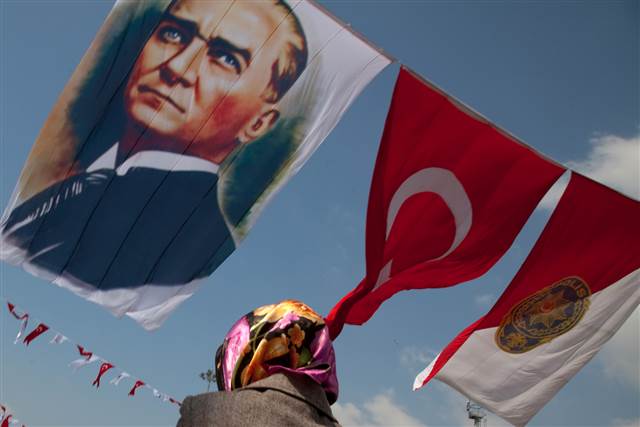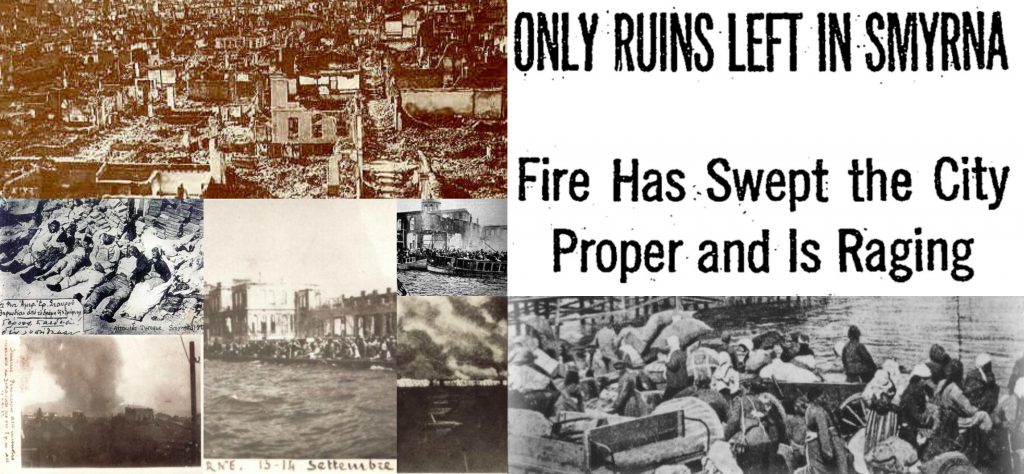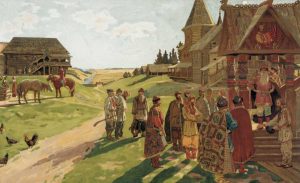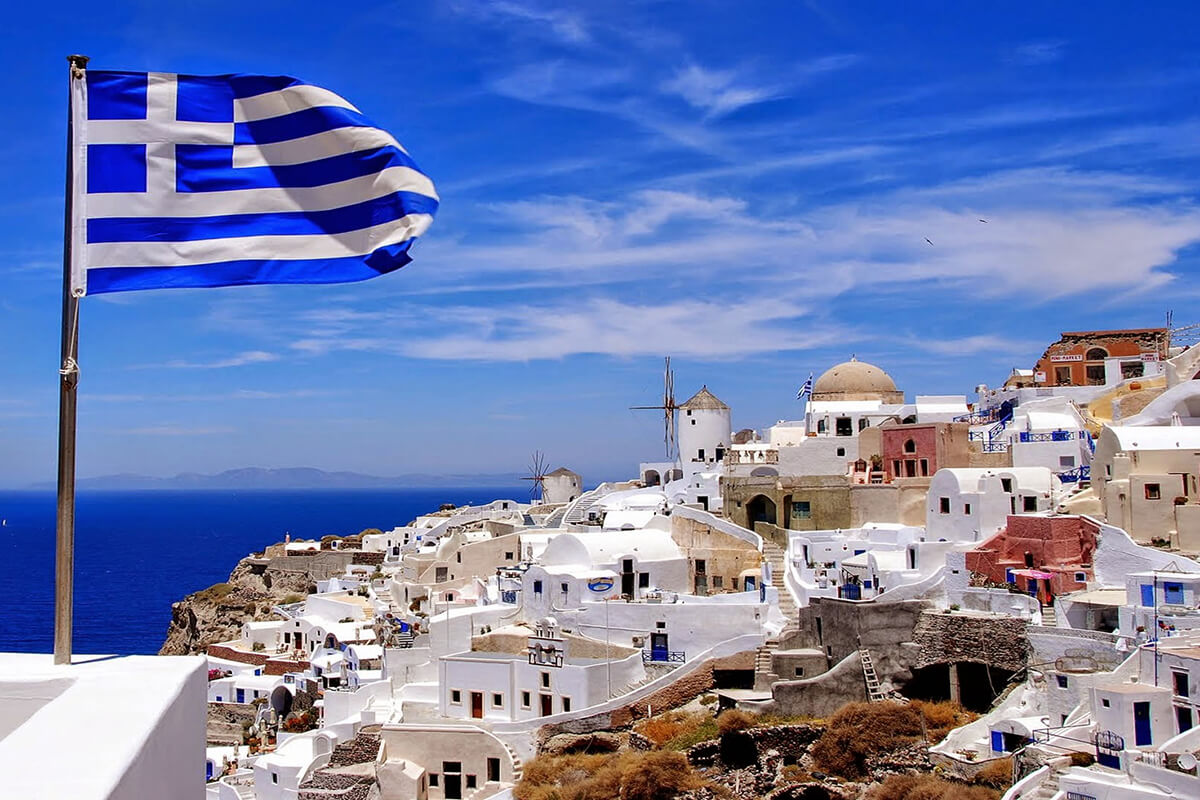
Views: 14583
Last week Pontian Greeks throughout the world justifiably recognized a tragic day in their history that has come to be known as the Pontian Genocide.
I wrote about the anniversary, obscure to most people around me who are not well-versed in Greek history and even had to repeatedly change my auto-correct on my computer, which insisted on changing the word Pontian to Pontiac.
This anniversary was followed by another recognition of yet another genocide of Greeks— officially commemorated on April 6 and recalling the tragic events targeting the Greeks of Eastern Thrace— the region known today as European Turkey or the lands just west of present-day Istanbul.
And then there’s the case of Smyrna and September 14, the day every year during which memorial services and events are held to remember the tragic events that culminated in September 1922, when hundreds of thousands of Greeks were massacred or forced to flee as refugees from their ancestral homes in Western Anatolia.
The Pontian Genocide, the Thracian Genocide, the Asia Minor Catastrophe— and add to that the Armenians and the Assyrians— other Christian groups once living and thriving in what was the crumbling Ottoman Empire in the early 1900s and you have a confusing mix of history— sometimes even competing with each other— when what was was really happening, was a single, orchestrated annihilation of a single religion of people— Christians.
But for reasons of brevity, I emphasize the Greeks alone, as I continue my post.
The comparison of the Holocaust in Europe during World War II and the Genocide of the Greeks of the Ottoman Empire in the early 1900s couldn’t be more direct.
You had a single mad man named Adolph Hitler who wanted to “clean” the continent of a single religion of people, Jews, who they themselves were divided by nationality, culture, language, even worship practice— but united as Jews. There were Ukranian Jews and Polish Jews and in Greece alone the Romaniotes and the Sephardic Jews.
And in the then Ottoman Empire, you had another crazed leader named Kemal Ataturk who, like Hitler, planned his own murderous rampage seeking to create a “Turkey for the Turks” with no place for people who were different— i.e., the Greeks (and other Christian minorities including the Armenians and Assyrians).
In Asia Minor, also known as Anatolia— there were the Pontian Greeks who lived along the coast of the Black Sea, and the Thracians and the westernized Ionian Greeks, who lived along the seashore facing the Aegean. And there were other, lesser-known communities too, who lived in the interior of Turkey, like the Cappodocians.
Each had their distinct dialects, food traditions and even worship traditions as some of these communities had adopted Turkish as their native and worship languages (like U.S. communities of Greeks have adopted English as theirs) but liturgies were still Greek Orthodox in faith and tradition.
But they were all Greeks— like the Jews of Europe.
The confusing ethnic and regional differences have, over the years, created a disjointed effort to remember, document and recognize the single mass atrocity that took place in the beginning of the 20th century— that of a systematic wiping out of entire populations of Greek people in the early stages of the building of modern day Turkey by its founder, Kemal Ataturk.
One website, which has done extensive research and documentation is seeking to set the record straight— and even called out my own efforts of recognizing the Pontian Genocide last week on this website.
The Greek Genocide Resource Center sent me an email, stating that “By calling for the recognition of a genocide only in the one region where it occurred, ie. Pontus, Pontic Greeks are effectively ignoring the suffering of all other Greeks that fell victim during the Genocide.”
At first glance, my knee-jerk reaction was one of disgust. “Can’t we all just get along?” I thought to myself. Unity has not been our best trait as a nation of people, I thought.
But at further notice and more reading— confirming what I already knew and also seeing a Facebook post by the same author of the email, it made perfect sense. The Greek Genocide Resource Center posted the following on their Facebook page just one day before Pontian Greeks were preparing to recognize and mourn their dead.
“Last month we commemorated the genocide of the Greeks from Eastern Thrace, today we commemorate the victims from Pontus, and on September 14 we will once again commemorate more victims of the Greek Genocide, those from western Asia Minor. There were many victims of the Greek Genocide, and for certain reasons Greeks prefer to mourn their ancestors based on region. What this has created is a disjointed effort for recognition. Pontic Greeks, considered the first to use the term genocide to describe the mass killing of Greeks in the former Ottoman Empire, have sought and received a day of mourning for their own victims, and till this day, continue to seek recognition solely for the victims of Pontus. This bias belittles and belies the true suffering of all the victims who were after all – GREEKS. Today we mourn the loss of many. This page at least, will continue to seek a SINGLE recognition for ALL the victims regardless of where they lived. We ask that all fair minded people look through the division and work to do the same. It was a GREEK Genocide.”
It was a single genocide. Plain and simple.
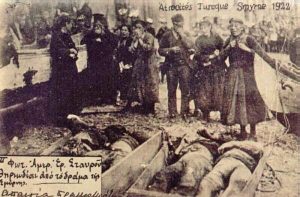 Of course, seeking to minimize one, over the other, is not the answer and seeking to bring together scholars, activists and societies of regional Greeks (i.e. Pontians, Smyrniots, Thracians and other descendants of all Anatolian Greeks) could prove next to impossible, let alone a futile effort.
Of course, seeking to minimize one, over the other, is not the answer and seeking to bring together scholars, activists and societies of regional Greeks (i.e. Pontians, Smyrniots, Thracians and other descendants of all Anatolian Greeks) could prove next to impossible, let alone a futile effort.
Because we are a ferociously proud— but splintered people. Cretans are proud of their Cretan lineage, and Pontians are proud of their own culture and history. The Arcadians and Laconians thrive as sub-cultures of a sub-culture of Peloponesians— and so on.
And this is not to say that the Pontians, the Smyrniots and others shouldn’t continue mourning their dead and remembering their ancestors’ sacrifices, the same way Ukrainian and Polish Jews commemorate their own very specific massacres. The difference being, of course, that it’s always under the umbrella of “The Holocaust” for them. And for us, we seek Congressional resolutions, city council proclamations and other official-type of recognitions in disjointed and individualistic efforts, NOT as a single Genocidal event, but as individual, regional efforts.
The Jews were able to unite their historians and communities from the ashes of World War II and create a single, unified campaign to inform the world of The Holocaust— a single, systematic effort by Nazi Germany to annihilate all Jews— Greek, Italian, Sephardic, Polish and dozens of other sub-cultures thriving under one umbrella of Judaism in Europe.
Will the Greeks ever be able to unite under a single GREEK effort that will bridge the gap amongst a confusing— yet single and systematic effort that took place between 1914 and 1922 to annihilate Greeks— regardless of region— from Anatolia?
I certainly hope so and the education and documentation that was provided to me by the Greek Genocide Resource Center has helped me to better understand that like The Holocaust, the genocide of Asia Minor’s Greeks— the Pontians, the Ionians, the Thracians and others— was a single, devastating, brutal campaign targeting Greeks.
The official population statistics from a 1914 Ottoman Empire census are telling— and show that in that year, there were over 1.7 million Greeks living in the empire. The numbers from less than a decade later are well known as most were either killed, or forced to flee.
And while we shouldn’t forget or minimize our individual efforts— perhaps it’s time— a century after these brutal and devastating events— to call it what it is— a GREEK GENOCIDE.
Originally published on 2016-05-22
Source: Pappas Post
Origins of images: Facebook, Twitter, Wikimedia, Wikipedia, Flickr, Google, Imageinjection, Public Domain & Pinterest.
Read our Disclaimer/Legal Statement!
Donate to Support Us
We would like to ask you to consider a small donation to help our team keep working. We accept no advertising and rely only on you, our readers, to keep us digging the truth on history, global politics and international relations.
FOLLOW US ON OUR SOCIAL PLATFORMS

